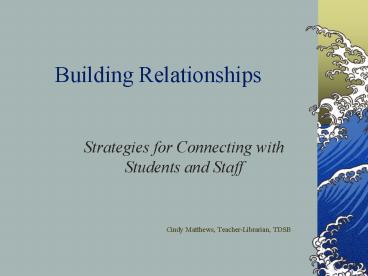Building Relationships PowerPoint PPT Presentation
Title: Building Relationships
1
Building Relationships
- Strategies for Connecting with Students and Staff
-
Cindy Matthews, Teacher-Librarian, TDSB
2
Building Relationships
- Establishing/Running a Partners in Action
School Library Information Centre - pragmatic foundations
- Learning-focused relationships with
- students and staff seeing the big picture
- Practical Strategies for Collaboration designing
learning activities for - critical thinking and professional dialogue
3
Pragmatic Foundations
- Flexible Scheduling communication
- Book Exchange building independence
- Collection and ICT Management
- accessing student leadership
- Staffing Advocacy using Research,
- Annual Reports, Action Research,
- Staffing Committees, Board leadership
4
Flexible Scheduling
- Just Like Me!
- I work at an elementary school.
- I am a half-time Teacher-Librarian.
- I have some flexible scheduling with open
Partners time. - I collaboratively plan and teach with teacher
colleagues. - I share and update my schedule with colleagues
using newsletters or e-mail.
5
Book Exchange
6
Collection and ICT Management
- Appreciative Inquiry accessing internal
resources to scaffold student leadership - Turn to your elbow partner and take a moment to
tell a story. How have you used student Library
Monitors to keep your Library collection and lab
tidy? Switch. - Join another pair. In a quad, introduce a
paraphrase of your partners anecdote.
7
Staffing Advocacy
- Paired Verbal Fluency or30-60-90 How do
you use research-based data, annual reports and
action research to advocate for your library? - Heres What! So What? Now What?
- (data) (interpretations)
(implications) - In what ways can Staffing Committees and Board
leaders support our relationships?
8
Learning-focused Relationships
- seeing the big picture collaborative learning
throughout the school - working with Students selection and design of
instructional practices - working with Colleagues promoting professional
dialogue based on student learning and skill
development
9
The Big Picture
- Asking Questions
- Is it possible to teach students
- to be critical thinkers and effective
- users of information and
- information technologies and
- at the same time improve their
- overall achievement levels?
10
- Herein lie important foundations for the
- building of an information literate school.
- We must develop a collaborative culture
- in the school so teachers and
- library media specialists
- have opportunities to work together
- as partners to design
- excellent learning experiences.
- (Carol Koechlin Sandi Zwaan)
11
Selection and Design of Instructional Practices
12
Intentionalizing Student Learning Metacognition
- Effective learners engage the process
- and the content simultaneously. The
- trick is to anticipate which strategies
- support content learning and which
- content knowledge makes strategy
- learning memorable.
- (Lipton Wellman, Pathways to Understanding)
13
Teaching and Promoting the Inquiry and Research
Process
- As cross-grade, cross-curricular information
coordinators, - teacher-librarians can assist teachers
- to plan and implement
- interdisciplinary curriculum
- and help students see
- the connections among subjects
- (OLA Information Studies K-12)
14
(No Transcript)
15
Promoting Professional Dialogue
16
Learning-Focused Verbal Tools
17
Paraphrasing
- Focused Reading Paraphrase Passport
- Got it. I know and or understand this.
- ! This is really important or interesting.
- ? I dont understand this or this does not
- make sense.
18
5-3-1
- Individually jot down 5 words that come to mind
regarding professional dialogue. - Each share your 5 words with your table group,
round-robin style. Choose 3 words to represent
everyones list. - As a group, choose 1 word which captures your
thinking.
19
Practical Strategies
- Intersecting pedagogy and
- student engagement
- The Inquiry and Research Process
- The Pathways Learning Model
- Building Community Tribes
- Relating so as to support life-long learning
- Cognitive Coaching
20
The Pathways Learning Model
- Pathways to Understanding Patterns and Practices
in the Learning-Focused Classroom - Laura Lipton, Bruce Wellman
(www.miravia.com) - Just Like Me
- Paired Verbal Fluency
- Heres what! So what? Now what?
- Focused Reading
- 5-3-1
21
Tribes
- Tribes A New Way of Learning and Being Together
Jeanne Gibbs (www.tribes.com) - Community Agreements
- Attentive Listening
- Appreciation /
- No Put Downs
- Right to Pass
- Mutual Respect
22
Cognitive Coaching
- Cognitive Coaching Foundation Seminar Learning
Guide Arthur Costa, Robert Garmston
(www.cognitivecoaching.com) - The mission of Cognitive Coaching is to produce
self-directed persons with the cognitive capacity
for high performance both independently and as
members of a community.
23
A Continuum of Interaction
24
Support Stances
- Know your intentions and
- choose congruent behaviours.
- All staff are leaders at different times and in
different circumstances.
(TDSB Staff
Development Frameworl
25
Learning-Focused Verbal Tools
- Attending Fully pauses and wait time
- Paraphrasing Listen to hear, not to speak.
- Mediational Questions
- Plural Forms are, some, a few
- Exploratory Language might, hunches
- Positive Presuppositions As you consider, ,
Thinking back, , As you examine the data,
26
Holonomy
- acting independently and as a
member of a community - (Cognitive Coaching Foundation Seminar A.
Koestler) - In the open seas of lifes learning
there is an ebb and flow,
between ourselves and others. - We share questions and observations
we listen and reflect. - These moments, big and small,
- develop new understandings and
- new waves of learning.
27
Shape Reflection
- An idea that struck me was
Some thoughts going around in my mind are
Three practical strategies upon which I can
base some Next Steps in my Library are
28
- Thank you!
- Cindy Matthews

